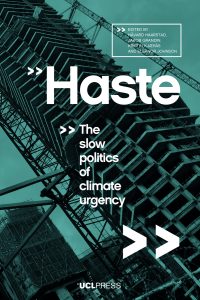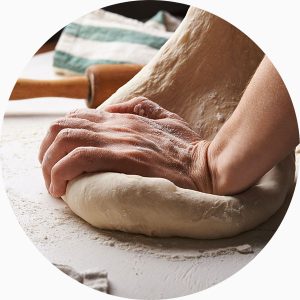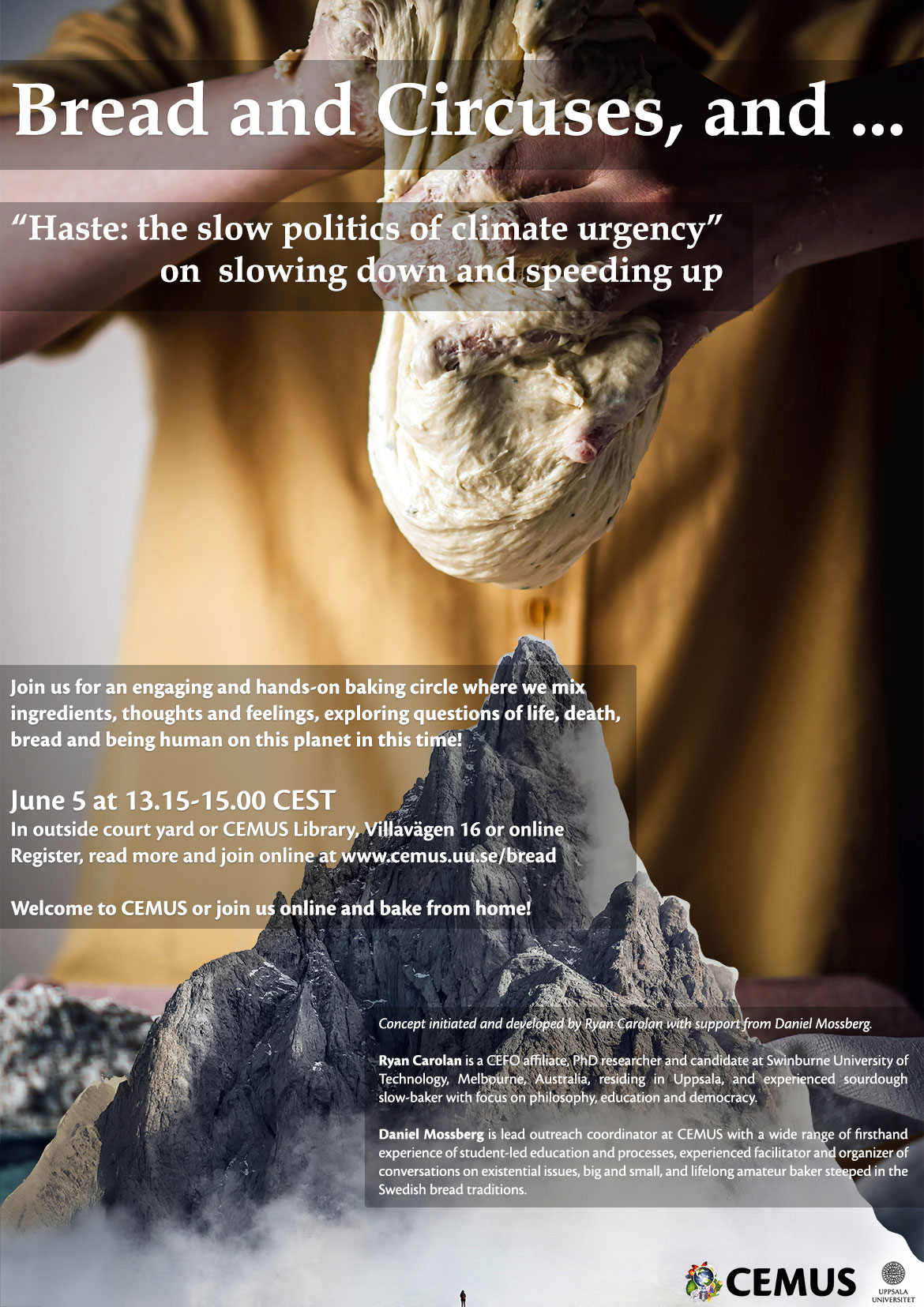Warmly welcome to our third and final baking circle this spring! Where we will bake and reflect, discuss the recently published book “Haste: the slow politics of climate urgency” (click for free access). Join us at CEMUS or online and bake from home!
This time with one of the editors of the book, Jakob Grandin, that did his research at SpaceLab, Department of Geography and the Centre for Climate and Energy Transformation and UiB Collaboratory, University of Bergen. Jakob will be joining us online from Bergen.
Concept initiated and developed by Ryan Carolan with support from Daniel Mossberg.
When: June 5 at 13.15-15.00 CEST
Where: Outside courtyard or CEMUS Library (depending on weather), Geocentrum, Villavägen 16, see map here https://link.mazemap.com/gVZ978v2
Online: https://uu-se.zoom.us/j/61984859923
How: Bring your own baking equipment and ingredients if you want to bake or just join the conversation, we provide an oven and good company
Registration: https://doit.medfarm.uu.se/bin/kurt3/kurt/101261
Upcoming dates: Autumn 2024 – dates coming
Background material
 Haste: The Slow Politics of Climate Urgency
Haste: The Slow Politics of Climate Urgency
Edited by Håvard Haarstad, Jakob Grandin, Kristin Kjærås, and Eleanor Johnson
A powerful argument for not approaching climate change in a hurry, but with a slow politics of urgency.
It’s understandable that we tend to present climate change as something urgently requiring action. Every day we fail to act, the potential for catastrophe grows. But is that framing itself a problem? When we hurry, we make more mistakes. We overlook things. We get tunnel vision.
In Haste, a group of distinguished contributors makes the case for a slow politics of urgency. Rather than rushing and speeding up, he argues, the sustainable future is better served by our challenging of the dominant framings through which we understand time and change in society. While recognizing the need for certain types of urgency in climate politics, Haste directs attention to the different and alternative temporalities at play in climate and sustainability politics. Divided into short and accessible chapters, written by both established and emerging scholars from different disciplines, Haste tackles a major problem in contemporary climate change research and offers creative perspectives on pathways out of the climate emergency.
Haarstad, H., Grandin, J., Kjærås, K. & Johnson, E. (eds.) (2023). Haste: the slow politics of climate urgency. London: UCL Press. Free access here: https://discovery.ucl.ac.uk/id/eprint/10162046/1/Haste.pdf
Ryan Carolan is a CEFO affiliate, PhD researcher and candidate at Swinburne University of Technology, Melbourne, Australia, residing in Uppsala, and experienced sourdough slow-baker with focus on philosophy, education and democracy.
Daniel Mossberg is lead outreach coordinator at CEMUS with a wide range of firsthand experience of student-led education and processes, experienced facilitator and organizer of conversations on existential issues, big and small, and lifelong amateur baker steeped in the Swedish bread traditions.
Concept and background by Ryan
And yet, as research is now confirming, words are rarely enough to process traumatic experiences, since these experiences are stored deep within structure of the body, ‘exiled to the various subterranean worlds of consciousness’, as Stephen Cope puts it.
How can we respond to this reality?
With the enormity of global crises facing humanity symbolised by the ecological crisis and the brutal fact that humanity is failing to respond effectively, this is an extremely important question. The obvious danger is that, under the shadow of this enormous challenge that is largely beyond comprehension, the powers that be responds in an Orwellian way by calling night day, further disconnecting us from our embodied experience and our deepest feelings.
 Following the passing of my son from a rare genetic disease on the 30th of December 2022, sourdough has become a way for me to cultivate life that I was otherwise denied. It has become a metaphor of life and a way of channeling my pain into an ancient practice that brings joy.
Following the passing of my son from a rare genetic disease on the 30th of December 2022, sourdough has become a way for me to cultivate life that I was otherwise denied. It has become a metaphor of life and a way of channeling my pain into an ancient practice that brings joy.
Bread and circuses and… is an attempt to create a space where the incomprehensible may be glimpsed, if only for a moment, through making bread and circuses. Fundamentally, it is premised on the assumption that only by reconnecting with our deepest feeling can we come to terms with what it means to be human in an age of impending ecological and social collapse. With this knowledge, it may be possible to respond more effectively to violent and traumatic events, and, possibly, break the conditions and cycles reproducing them.

